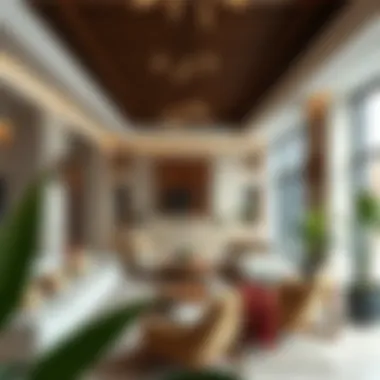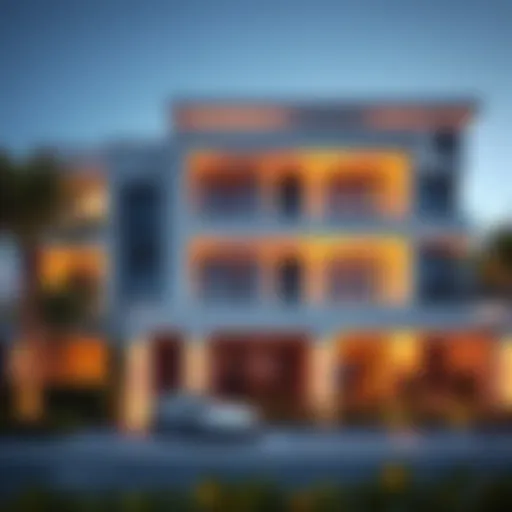Room Options in Dubai: A Comprehensive Guide


Intro
Navigating the labyrinth of accommodations in a bustling metropolis like Dubai can seem daunting. With its unmatched skyline and diverse culture, the city offers an array of room options that cater to various tastes and budgets. As expatriates flock to the United Arab Emirates, understanding the unique offerings within the real estate market is crucial for anyone looking to invest or reside here. In this exploration, we’ll delve into the various categories of housing, analyzing pricing dynamics, cultural undercurrents, and essential amenities that shape the living experience.
Market Trends and Analysis
Current Market Conditions
Dubai's real estate sector is a hotbed of activity, driven by a confluence of factors, including economic growth and steady population influx. According to recent reports from the Dubai Land Department, property transaction volumes have surged, signaling buoyancy in the market. High-rise apartments in areas like Dubai Marina and Downtown are particularly in demand, offering luxurious amenities and proximity to key lifestyle destinations.
The pricing landscape is also intriguing: while luxury properties command a premium, there’s been a noticeable shift towards affordable housing options as well. This trend reflects a growing understanding among developers about the diverse needs of potential residents. Properties like those in the Dubai Sports City area are providing more budget-friendly options without compromising on quality.
Future Predictions and Growth Areas
Looking ahead, several growth areas seem poised for expansion. The government’s commitment to innovative projects, like the Dubai 2040 Urban Master Plan, outlines a vision for sustainable development. This plan aims to enhance the quality of life and diversify housing, focusing on community-centric designs.
In particular, we might see a surge in interest around the newly developing districts such as Dubai Creek Harbour. This area promises modern architecture harmonized with natural beauty, likely appealing to younger expats and families alike.
"As the city evolves, new neighborhoods are crafted, making room for fresh ideas and global standards of living."
Property Investment Strategies
Types of Properties to Consider
When it comes to property investment in Dubai, choices are plentiful. Here’s a quick rundown on what’s typically on the menu:
- Luxury Apartments: Often found in iconic towers, these properties provide not just shelter, but an upscale lifestyle. Expect high-end amenities such as concierge services and fitness centers.
- Villas and Townhouses: For families seeking space, villas in communities like Arabian Ranches offer tranquility and integrated family facilities.
- Studio and One-Bedroom Units: Ideal for singles and young professionals, these smaller spaces are often centrally located near business districts or popular leisure zones.
- Commercial Properties: With the rise of startups, investing in small office spaces or retail units could yield promising returns.
Financing Options and Considerations
Financing your property can seem like a riddle wrapped in a mystery. However, some pathways make this process manageable. Local banks provide mortgage products tailored for expatriates, accommodating both residents and non-residents. Important factors to consider include:
- Down Payment Requirements: Generally ranging from 20% to 30% for non-residents.
- Interest Rates: Typically variable; researching the best rates early on can save considerable sums in the long run.
- Legal Requirements: Navigating the regulations surrounding foreign ownership in Dubai is crucial. While most properties can be owned outright, some areas may have restrictions.
By understanding the market trends and having a game plan for investment, potential buyers can make informed decisions that align with their goals. Meanwhile, expatriates navigating life in Dubai will benefit from this comprehensive overview that underscores the vibrancy and diversity of accommodation options available.
Understanding the Concept of 'Room' in Urban Living
When discussing urban living, the term "room" encompasses more than just a physical space; it reflects the very essence of how people engage with their surroundings. In the context of a bustling metropolis like Dubai, understanding the concept of room involves examining not only the structural elements but also the social, cultural, and economic dimensions that influence housing decisions.
A room can be seen as a backdrop to life’s narratives. Whether it's a cozy corner where families gather or a lavish apartment offering breathtaking views of the skyline, each room contributes to the individual experience of urban living. This exploration is crucial for real estate agents, investors, and anyone looking to settle in Dubai, as it shapes their understanding of what spaces best meet their needs and desires.
Importance of Room Configurations
Room configurations in cities are pivotal. They must cater to a diverse population with varied tastes and lifestyles. In Dubai, for instance, one finds an array of environments ranging from bustling studio apartments in the city center to upscale villas in quieter neighborhoods. The configurations also refer to how a room is utilized, blending work, leisure, and socialization into one functional space.
- Versatile Spaces: A room can serve multiple purposes, especially in smaller apartments where optimizing space is key. This flexibility allows residents to adapt their living arrangements without the need for extensive renovations.
- Community Building: Room options also foster community. Open-plan living spaces can encourage social interactions, breaking down barriers that often exist in more traditional setups.
Benefits of Understanding Room Dynamics
By grasping the dynamics of room options, potential residents can make informed decisions that enhance their living experience. Here are a few benefits:
- Tailored Living Solutions: Understanding the nuances of different room types allows individuals to select spaces that resonate with their lifestyle preferences, whether they prefer vibrant city life or peaceful retreats.
- Investment Insight: Investors, too, can benefit from this knowledge. It enables them to identify trends and acquire properties that align with current demands. For example, shared housing arrangements are becoming increasingly popular among young professionals and students looking for affordable options.
- Adapting to Cultural Changes: The ever-evolving demographics within a global city like Dubai influence room expectations. As newcomers from various backgrounds seek homes, room types that reflect cultural diversity gain importance.
"In Dubai, the concept of room transcends traditional boundaries; it reflects the aspirations of a global populace and shapes the city's real estate landscape.”
Key Considerations for Room Choice
From a practical standpoint, several key considerations influence the preference for different types of rooms:
- Comfort vs. Cost: Often, individuals have to balance comfort with affordability. The understanding of the cost-to-comfort ratio can guide a person toward more suitable choices.
- Lifestyle Alignment: A room must align with one’s lifestyle— older adults may favor ground-level apartments for easy accessibility, while younger individuals might gravitate toward high-rise buildings for vibrant urban living.
- Future Prospects: Given the rapid growth of Dubai, potential residents should also consider the long-term value and adaptability of their room choices.
Significance of Room Choices in International Cities


When considering space in bustling metropolitan areas, the significance of room choices emerges as a pivotal element in shaping people's lifestyles and living conditions. In international cities like Dubai, where real estate markets are dynamic and varied, the options available go far beyond mere square footage. These choices reflect personal preferences, cultural backgrounds, and economic capabilities.
One of the core benefits of having diverse room options is that it caters to a broad spectrum of demographics. Whether one is a high-flying executive seeking luxury or a young professional on a budget, the availability of different types of accommodations ensures that there's something for everyone. This inclusivity is essential in a melting pot city like Dubai, where expats make up a significant portion of the population.
From the perspective of economic viability, room choices can greatly influence the housing market. An influx of investors and expatriates seeking residency in Dubai drives demand for various kinds of properties. As a result, the real estate sector must adapt to these shifting demands by curating options that range from opulent villas to budget-friendly shared housing. This aspect brings about competition that benefits residents by fostering innovation and improved living conditions.
Considerations around cultural relevance also come into play. Different communities might prioritize distinct amenities or features in their living spaces. For instance, a family from India might favor accommodations with communal spaces for gatherings, while a Western expatriate may lean towards more modern, minimalist designs. The way people choose their rooms transcends aesthetic preferences, becoming a reflection of their cultural values and lifestyle.
Furthermore, insights into pricing trends reveal another layer of significance. Knowing the costs associated with each type of accommodation allows individuals to make informed choices that align with their financial situations and future plans. The fluctuating market prices, influenced by a myriad of factors such as location and economic conditions, underscore the necessity of understanding the implications of room selection. As the expression goes, "you get what you pay for"; therefore, understanding the relationship between room type and price becomes vital for anyone investing in Dubai's real estate.
"Room options are not just rooftops over heads; they are pivotal in determining quality of life, social connections, and financial stability."
Ultimately, the significance of room choices in international cities like Dubai cannot be overstated. The multifaceted nature of these accommodations impacts not just the individuals who occupy them but also the wider community and economy. Making informed choices about where to live requires a deeper understanding of these significant factors and their implications. As the city's housing landscape continues to evolve, so too will the importance of room selection as a significant, thoughtful, and deliberate process.
Dubai: A Global City Shaping Room Trends
Dubai stands as a remarkable example of how a city can evolve and redefine the concept of living space. With its rapid growth and cosmopolitan environment, it has emerged as a pivotal player in the global real estate scene. The combination of innovative architecture, strategic location, and a melting pot of cultures makes Dubai a trendsetter in the accommodation landscape.
The importance of understanding how Dubai shapes room trends is multifold. For one, it is a reflection of the city’s ability to adapt to the needs of its diverse population. As expatriates from all walks of life flock here, their preferences influence the type of housing available. Developers and investors are tuned into these trends, keen on meeting demand while also capitalizing on lucrative opportunities.
Key Elements That Shape Room Trends in Dubai
- Cultural Diversity: With over 200 nationalities residing in Dubai, cultural influences significantly affect design choices, amenities, and even the functionalities of living spaces. This diversity drives the demand for a wide range of accommodation options that cater to specific cultural preferences.
- Technological Integration: Dubai is not just about luxury. The city embraces high-tech solutions in its real estate ventures. Automated living spaces, smart home systems, and advanced construction methods are prominent. This tech-savvy edge attracts a modern demographic that seeks convenience and luxury in their living environments.
- Sustainability: Over recent years, there has been a perceptible shift towards eco-friendly living spaces. As global awareness about sustainability increases, many developers in Dubai are creating green buildings that cater to environmentally conscious residents. The focus is not just on luxury but also on responsible living.
- Economic Factors: The UAE's strong economy directly influences pricing trends and availability. From the influx of foreign investments to the local job market's health, economic dynamics play a crucial role in shaping housing trends.
- Government Initiatives: Dubai's leadership has consistently rolled out policies promoting foreign investment in real estate. This, in turn, encourages a constant influx of new developments, keeping the market fresh and diverse.
Types of Accommodations Available in Dubai
Understanding the various types of accommodations in Dubai is crucial for anyone looking to navigate the competitive real estate market. This city is a cornucopia of options, catering to a range of preferences and budgets. From extravagant luxury villas to practical shared housing, the choices are both plentiful and diverse.
The importance of recognizing these types lies in the ability to match one’s lifestyle needs with the right living space. Investors, expatriates, and homeowners alike must consider not just the amenities offered, but also aspects like neighborhood dynamics and long-term value. Making an informed choice when selecting a room option can tremendously enhance one’s quality of life in this vibrant metropolis.
Luxury Villas: A Status Symbol
Luxury villas in Dubai are often seen as symbols of wealth and sophistication. Nestled in upscale neighborhoods like Emirates Hills and Palm Jumeirah, these properties offer unmatched opulence and exclusivity. With features such as private pools, landscaped gardens, and expansive views, they cater to an elite clientele seeking both comfort and prestige.
However, owning a luxury villa comes with its share of responsibilities. Maintenance costs can be considerable and often require engaging professional services. Decision-makers should weigh the benefits of communal living amenities against the independence and space offered by such homes.
Modern Apartments: Convenient Urban Living
Modern apartments in Dubai present an enticing option for those seeking urban convenience without the hefty price tag of luxury villas. These apartments can be found in various neighborhoods, each offering a unique atmosphere, from the bustling vibe of Downtown Dubai to the serene environment in Dubai Creek.
Many modern units come equipped with state-of-the-art facilities like gyms, swimming pools, and 24-hour security. This development enables residents to live a life that balances work and leisure effectively. Moreover, the proximity to transportation networks simplifies commuting for professionals, making these apartments highly favored among expatriates.
Shared Housing: Cost-effective Solutions
Shared housing represents an increasingly popular choice for budget-conscious individuals and expatriates. These arrangements provide an affordable living solution while fostering a sense of community among residents. In Dubai, many shared housing options are tailored towards specific demographics, such as students or young professionals.
Benefits of shared living include lower rent, shared utilities, and the formation of networks that can be invaluable in this vast city. However, potential residents should consider compatibility with roommates and house rules before making a commitment, as these factors significantly affect the living experience.
Short-term Rentals: Flexibility for Travelers
Short-term rentals have carved out a niche in Dubai's accommodation landscape, especially catering to tourists and business travelers. Platforms like Airbnb and Booking.com have flourished, offering diverse options ranging from lavish penthouses to cozy studios. This flexibility allows visitors to experience Dubai on their own terms, whether they're in town for a few days or several weeks.
Despite the advantages, travelers should be mindful of local regulations regarding short-term rentals. Some neighborhoods have restrictions that might impact their chosen accommodation. It's essential to do thorough research to ensure compliance with local laws and to find a rental that truly meets one’s expectations.
In summary, the accommodation types available in Dubai cater to a wide range of needs and lifestyles. Whether one opts for a luxurious villa, a modern apartment, cost-effective shared housing, or a flexible short-term rental, understanding the nuances of each option is key to making informed decisions in this bustling city.
Key Takeaway: Selecting the right type of accommodation in Dubai is essential for a satisfying living experience. Proper evaluation of options can lead to a fulfilling stay in this dynamic urban environment.
Factors Influencing Room Choices in Dubai
In the lively metropolis of Dubai, the dynamics of room choices are shaped by myriad factors, each intertwining to create unique living experiences. Understanding these influences is crucial not just for potential residents but also for real estate professionals and investors keen on tapping into this booming market.
Demographics and Expat Population
Dubai's blend of cultures and nationalities contributes significantly to room preferences. The city boasts an extensive expatriate community, comprising over 80% of its population. This melting pot brings varied cultural backgrounds and lifestyles, which directly shape housing demand.


- Many expats seek modern apartments in convenient locations due to the fast-paced lifestyle.
- Others might prefer larger family homes in quieter neighborhoods, reflecting their personal preferences.
The diversity also influences accommodation features; for instance, Western expatriates might favor furnished units and short-term rentals, while others might prioritize larger kitchens or communal spaces. Knowing these demographic breakdowns is vital for anyone looking to invest in or rent out properties in Dubai.
Economic Climate and Real Estate Trends
The pulse of Dubai’s real estate market is heavily influenced by the broader economic environment. Over the past decade, fluctuating oil prices have affected investment patterns, leading to a surge in certain areas while others saw a downturn.
When the economy booms, luxury accommodations tend to see a spike in demand as high-net-worth individuals flock to the city. Conversely, during times of economic uncertainty, more affordable housing options become appealing, pushing the demand for shared housing or suburban rentals.
- Current trends also show an inclination towards properties that offer flexibility, like short-term rentals.
- With developers now responding to these trends, more projects are being launched in strategic areas across the city, providing varied options for different budgets.
Understanding these economic nuances helps prospective buyers and renters make informed decisions that align with market conditions.
Cultural Preferences and Lifestyle Choices
Culture is another cornerstone influencing how residents choose their living spaces. In Dubai, traditional values meet modern living, creating a mashup of preferences that can affect everything from the layout of a room to the amenities offered.
For example, many Islamic families might prioritize privacy, opting for layouts that ensure separate living spaces for males and females. Likewise, communal areas may be essential for gatherings, contrasting with Western preferences for open-concept living.
- Lifestyle choices, such as commuting habits or proximity to schools, heavily influence room selections. Many families consider access to quality schools as a top priority, often leaning towards more suburban locales that offer family-friendly amenities.
- On the other hand, professionals might seek accommodations closer to business districts for convenience.
The interplay between culture and lifestyle magnifies the variety of room configurations available, ensuring that all residents can find a space that feels like home.
Understanding the layers of demographic, economic, and cultural influences is key for anyone interacting with Dubai’s housing market.
Pricing Trends for Rooms in Dubai
Understanding the pricing trends for rooms in Dubai is crucial for anyone looking to invest or find accommodation in this thriving metropolis. Pricing not only reflects the market dynamics but also gives insights into the economic climate, demographic changes, and even cultural shifts. With Dubai being a melting pot of nationalities, the demand and supply of real estate can change in the blink of an eye, making it essential for prospective residents and investors to stay informed.
Renting vs Buying: A Cost Analysis
When weighing your options in Dubai, the rent vs buy dilemma is a biggie. Renting often gives flexibility, attracting expatriates who may not wish to settle permanently. On the other hand, buying real estate can be seen as an investment — a way to plant roots in a city known for its luxury developments. However, navigating these waters requires delving into specific financial elements:
- Initial Costs: Renting typically requires a few months' deposit, but buying means fronting hefty fees like a down payment.
- Monthly Outgoings: Rent can seem more manageable, but owners must consider mortgage repayments, maintenance, and property taxes.
- Value Appreciation: In a market as dynamic as Dubai’s, real estate values can soar. A purchase could potentially yield returns that cover ownership costs and then some.
For those on the fence about which route to choose, it’s wise to assess long-term plans. Consequently, understanding the immediate financial burden versus future asset potential is key.
Average Pricing Across Different Neighborhoods
In Dubai's varied landscape, prices for housing can feel like a piece of string — they range drastically based on location. Each neighborhood offers unique attributes that influence pricing:
- Downtown Dubai: Home to the Burj Khalifa, expect the highest prices here. Luxurious apartments come at a premium.
- Dubai Marina: Living here means enjoying stunning views and vibrant nightlife but at a hefty price tag compared to quieter areas.
- Jumeirah: This area’s beachfront access often means properties are pricey. Yet, it holds a blend of tradition and modernity.
- Deira and Bur Dubai: These historical areas provide more affordable options. They boast rich cultural elements and could be easier on the wallet for those looking to save.
This adaptation for living reflects broader patterns in urban expansion and growth. Potential buyers and renters need to take neighborhood culture into account alongside pricing.
Market Fluctuations and Their Impact
The real estate market in Dubai is notorious for its fluctuations, often tied to the global economic climate. Factors influencing these market movements include:
- Investor Sentiment: Positive or negative news can swing prices higher or lower almost overnight.
- Regulatory Changes: New rules regarding property ownership can make or break a market, altering its attractiveness to foreign investors.
- Global Events: Economic crises or even tourism booms can impact demand significantly, driving up prices in high-demand suburbs while other areas may see stagnant rents.
"Investing in Dubai's real estate can be like riding a roller coaster. Understanding the ebbs and flows is essential to remain both savvy and secure in your choices."
Neighborhood Insights: Where to Find the Best Rooms
In a bustling metropolis like Dubai, the quest for the perfect room is often not just about the physical space. It's about embracing the nuances that each neighborhood offers. Location plays a critical role, influencing everything from lifestyle choices to social interactions and even investment potential. Therefore, gaining insights into various neighborhoods is pivotal for anyone aiming to settle down or invest in Dubai's real estate market.
When choosing a room, proximity to workplaces, schools, amenities, and cultural sites can tip the scales. Each neighborhood embodies its unique character, catering to different preferences and demographics. The vibrancy of the surrounding environment must resonate with personal lifestyles, making location an essential consideration for expatriates, investors, and homeowners alike. With this, let's delve into three prominent neighborhoods that illustrate the distinctive lifestyle options available in Dubai.
Downtown Dubai: The Heart of Luxury Living
Downtown Dubai is often seen as the crown jewel of the city. Home to iconic structures like the Burj Khalifa and the expansive Dubai Mall, this area is synonymous with luxury. The architecture is striking, combining modern designs with artistic elements, thus creating an urban tapestry that captivates residents and visitors alike.


Living here means more than just having a view of the city skyline. The heart of Downtown beats with life, reflected in the fine dining, shopping, and cultural experiences available. Residents enjoy easy access to world-class entertainment options, making it an attractive place for affluent expatriates and investors looking for prime real estate.
However, with luxury comes a price. Room costs in Downtown Dubai are typically higher, reflecting the premium that comes with this central location. It offers a lifestyle of convenience but also requires one to weigh whether the investment aligns with their financial capabilities.
"Investing in a property in Downtown Dubai can be a wise decision, given the area's ongoing development and international appeal."
Dubai Marina: A Coastal Lifestyle
Dubai Marina is famed for its beautiful views and vibrant lifestyle. Picture this: winding canals, yachts bobbing gently in the water, and a bustling promenade lined with cafes and restaurants. The marina caters to a diverse population, including expatriates who appreciate its cosmopolitan atmosphere.
Here, you can choose from a variety of building styles ranging from contemporary to classic. Apartments, especially those with panoramic views of the Arabian Gulf, are quite popular. This area is fantastic for those who enjoy outdoor activities, as it offers numerous parks and beach access. However, it is important to note that the demand for accommodation can lead to pricing that sometimes rivals that of Downtown Dubai.
If you're the sort who thrives in an active environment filled with life, living in Dubai Marina is definitely compelling. Just ensure your budget aligns with the premium that a coastal lifestyle commands.
Jumeirah: Cultural and Natural Attractions
Jumeirah stands out as a neighborhood that seamlessly blends cultural richness with natural beauty. Known for its stunning beaches and iconic landmarks, it attracts families and individuals who seek a balance between leisure and cultural engagement. The area is also home to several heritage sites and thriving marketplaces, offering a glimpse into Dubai’s history.
Many residents appreciate the tranquility Jumeirah provides while still being a stone's throw from the vibrant city life. Villas and residential buildings here often feature traditional aesthetic elements, reflecting the cultural fabric of the UAE. Moreover, the community vibe is strong, with schools, parks, and family-friendly amenities positioned throughout the area.
Ultimately, Jumeirah represents a more laid-back side of Dubai, appealing to those who value a slower-paced lifestyle enriched by cultural experiences and natural surroundings.
Future Outlook: Room Options in Dubai
As Dubai continues to evolve as a global hub, the future of room options in this city looks promising. Various elements contribute to these expectations, including social trends, economic shifts, and technological breakthroughs. Understanding this outlook is crucial not just for potential residents but also for investors and real estate developers. The insights gained can inform strategies for navigating the competitive property landscape in this vibrant metropolis.
Emerging Trends in Room Configurations
Recently, room configurations in Dubai are witnessing an evolution aimed at maximizing space while catering to diverse lifestyles. Many new developments focus on flexibility in living arrangements, allowing for transformable spaces. For instance, among working professionals, demand for multi-functional home offices has surged, leading to designs that allow rooms to serve dual purposes.
Additionally, the rise of co-living spaces presents innovative solutions to urban housing challenges. Here, communal areas foster social interactions while maintaining privacy in personal quarters. Such models not only enhance community living but also create an efficient use of resources.
Examining the data, shared spaces in the urban core have risen by over 20% in the past year alone, according to the Dubai Land Department's reports. As Dubai embraces younger generations and remote workers, we’ll likely observe more adaptations in room configurations that reflect lifestyle preferences.
Sustainability and Eco-friendly Developments
Sustainability is no longer just a buzzword; it’s becoming a defining principle in future room options. Eco-friendly buildings are gaining traction as a response to growing environmental concerns. In Dubai, several projects showcase energy-efficient designs that incorporate solar panels, smart energy systems, and sustainable materials.
Incorporating green elements not only benefits the environment but also provides several advantages, such as lower utility costs and improved air quality. A notable example is the Mohammed bin Rashid Al Maktoum Solar Park, which powers numerous residential developments. By 2025, many new residential properties are projected to meet stringent sustainability standards, aligning with the UAE's vision for a greener future.
Key considerations for eco-friendly developments:
- Use of renewable energy sources
- Water conservation techniques
- Sustainable construction materials
- Designing for natural light and ventilation
These changes reflect a growing trend where buyers and renters favor properties with green certifications, pushing developers to adapt accordingly.
Technological Advancements in Real Estate
Technology is playing a pivotal role in reshaping how room options are configured and marketed in Dubai’s real estate market. Innovations like virtual reality walkthroughs and artificial intelligence platforms allow potential buyers to explore properties remotely, simplifying the decision-making process.
Moreover, smart home technology is increasingly integrated into new builds. Features like automated lighting, smart temperature control, and advanced security systems are becoming standard. These advancements enhance the living experience by providing convenience and efficiency.
Blockchain technology is also expected to revolutionize transactions within the real estate market. The ability to maintain transparent, tamper-proof transaction histories can build greater trust among buyers and sellers alike.
The journey to finding the right room option in Dubai is evolving through innovation and thoughtful design, making it an exciting time for potential residents and investors alike.
Closure: Making Informed Choices in Room Selection
Selecting the right room in a bustling metropolis like Dubai requires significant thoughtfulness and research. With the city's dynamic and evolving real estate landscape, understanding the myriad options and factors influencing room selection is paramount for any potential inhabitant or investor. This article has explored various dimensions of accommodation in Dubai, elucidating key attributes to consider when embarking on this important journey.
First and foremost, one must evaluate their priorities—whether it’s space, location, or amenities. Different neighborhoods cater to distinct lifestyles; Downtown Dubai appeals to those wanting the pulse of the city, while Dubai Marina attracts lovers of coastal living. Moreover, cultural nuances may affect one’s choice, as expatriates often look for community and comfort while balancing local customs.
Additionally, comprehending pricing trends is equally crucial. With rent and purchase prices influenced by market fluctuations, understanding these elements can save one from financial pitfalls. For instance, in certain areas, rental rates have surged due to high demand, thus making the need for astute financial planning all the more essential for buyers and renters alike.
Furthermore, many prospective residents overlook the importance of sustainability and technological advancements related to housing options. As the world moves towards more eco-friendly practices, seeking accommodations that align with these values can offer not only environmental benefits but potential cost savings in the long run.
To summarize, making informed choices about room selection in Dubai means blending personal needs with market insights. It’s about navigating cultural landscapes, understanding economic indicators, and recognizing the importance of amenities that enhance one’s lifestyle. As the real estate market continues to evolve, staying well-informed is not just prudent but necessary for those wishing to call this vibrant city home.
"Knowledge is power; however, the application of that knowledge ensures a solid foundation for making beneficial choices."
In the end, for investors, expatriates, and homeowners, successfully finding the right room in Dubai is akin to solving a complex puzzle. Each piece—from pricing trends to neighborhood characteristics—plays a crucial role in fitting the picture together. Therefore, the essence of informed decision-making should never be underestimated.











